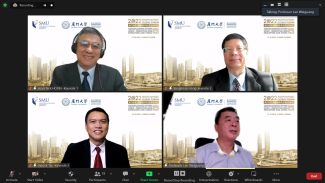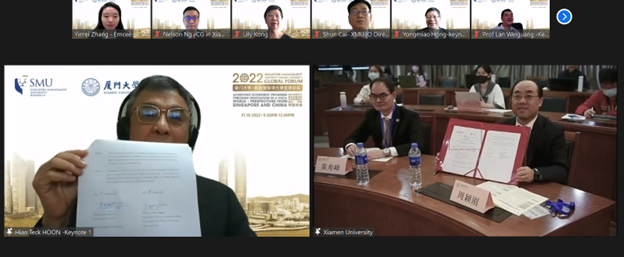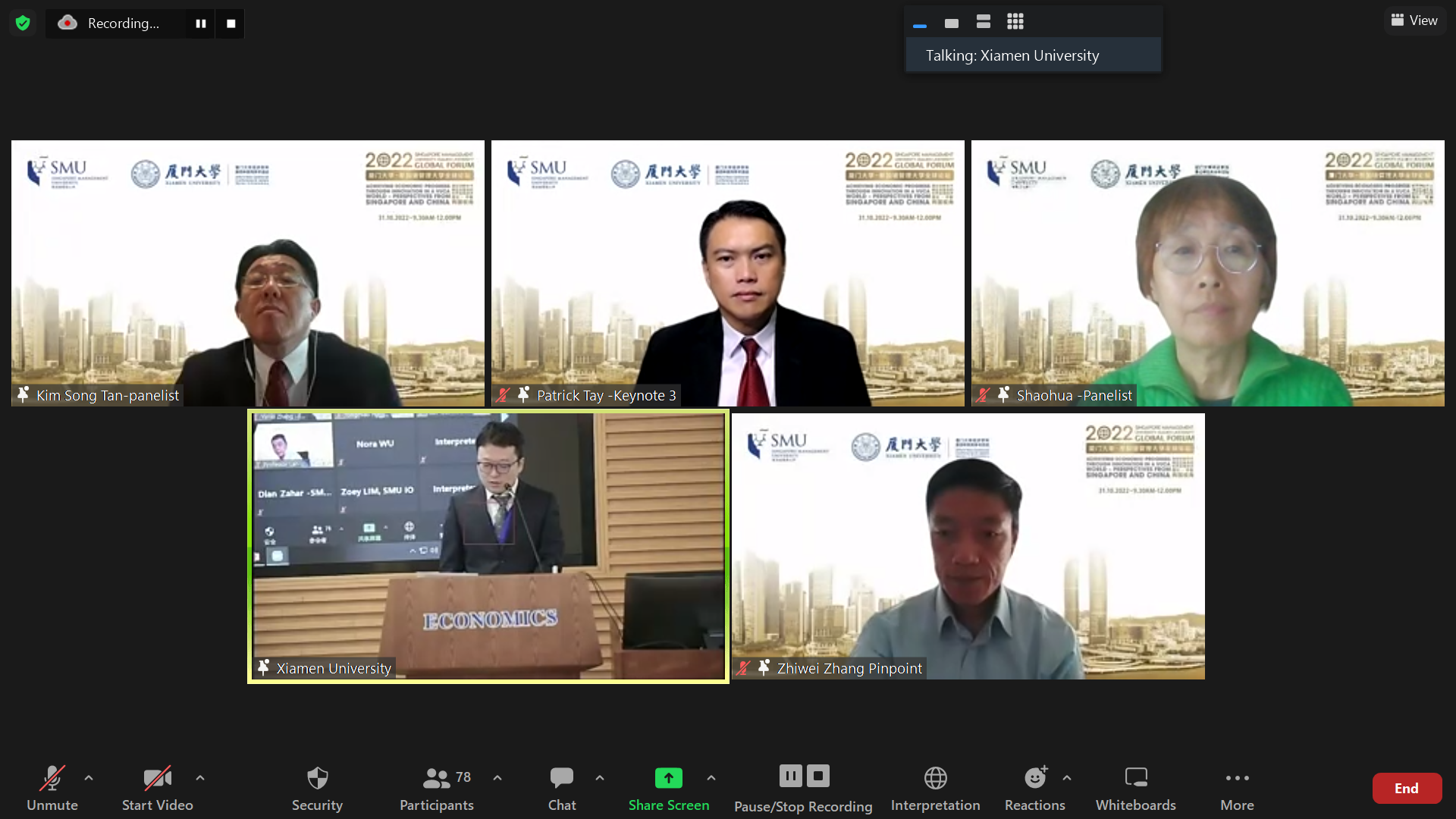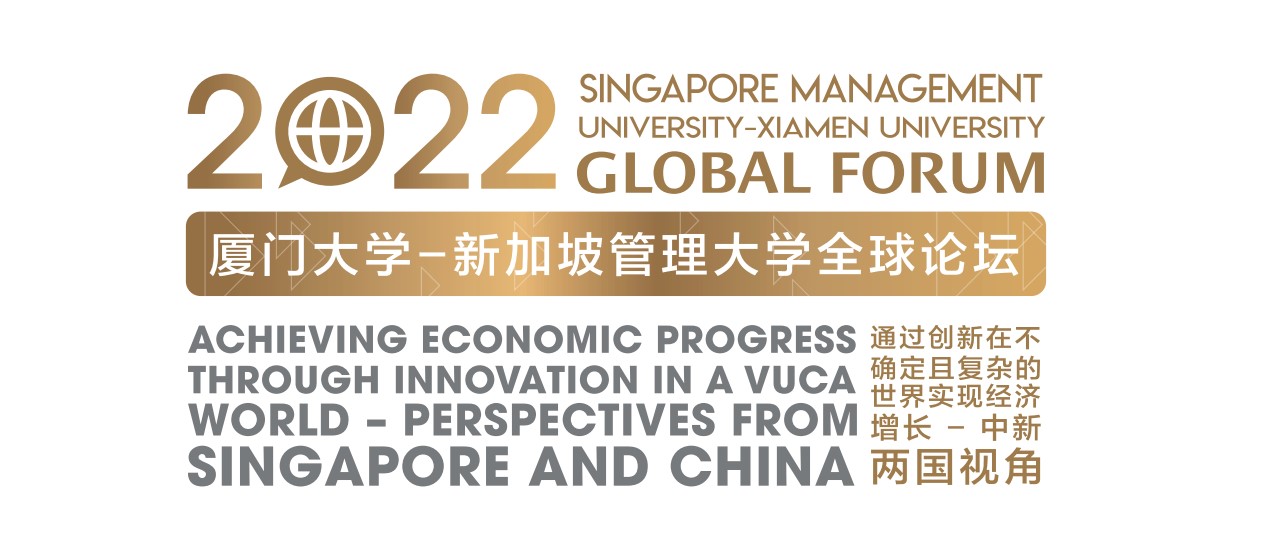
“As a mature economy, Singapore’s continued economic progress will depend on its productivity growth, which in turn will depend on technological diffusion from abroad, as well as indigenous innovation”, said Singapore Management University’s (SMU) Dean of School of Economics (SOE), Professor Hoon Hian Teck, at the SMU-Xiamen University (XMU) Global Forum on 31 October 2022.
“While indigenous innovation is partly driven by spending on research and development by the private sector, as well as the higher education sector and public research institutes, it is importantly undertaken too by economic actors at the grassroots conceiving new products and better processes.”
Prof Hoon put forth these ideas in his keynote speech, titled “Achieving Economic Dynamism and Inclusion in the Face of Global Challenges: The Case of Singapore”, at the 10th edition of the Global Forum series. This year’s edition, held virtually, convened academic and industry leaders from Singapore and China, to share perspectives and experiences of the two countries in creating innovation to achieve sustained economic progress in a VUCA (Volatile, Uncertain, Complex and Ambiguous) world.
Noting that larger firms tended to be more productive and were net exporters, while smaller firms were less productive and focused on the domestic market, Prof Hoon suggested that “Singapore’s new source of growth will have to come from increasing the share of firms across different industries that cross the productivity threshold to be able to internationalise”.
“Established firms may be hesitant to launch new and higher-quality products for fear that existing product lines may be displaced as customers shift their purchases away. Small firms and start-ups have greater incentive to find new niches, but they are limited by the availability of financing. As new start-ups drive innovation in the new economy, a central relationship that comes into focus is that of financiers and entrepreneurs.”
Prof Hoon was of the view that the supply of entrepreneurs could increase with investment to provide students with opportunities to venture into the unknown, leading to better matches between angel investors and people with good business ideas. This could in turn enhance the expected returns to financiers and increase the number of start-ups that receive financing. More successful early-stage business ventures might then stimulate the supply of financing from venture capitalists.
The Founding Dean of XMU’s Wang Yanan Institute for Studies in Economics (WISE), Prof Hong Yongmiao, focused his keynote on the analysis of China's data resources and its status of data flow, and shared perspectives on accelerating the promotion of cross-border data flow. Noting that China has been a major beneficiary of economic globalisation over the last four decades, Prof Hong, who is also Dean of the University of Chinese Academy of Sciences’ School of Economics and Management, said that “unlike the situation in the last three industrial revolutions, China has, in the current digital revolution, not only kept pace but taken the lead in digital economy and fintech.”
At the Forum, SMU SOE signed a Memorandum of Understanding for academic collaboration with XMU’s WISE and SOE, witnessed by Guest-of-Honour, Mr Nelson Ng Chiun Ming, Consul-General of Singapore in Xiamen, and the Presidents of both universities. In her welcome address, SMU President, Prof Lily Kong, said that it is more important than ever for institutions to work hand-in-hand to harness collective strengths in research and education in an interconnected world. XMU President, Prof Zhang Zongyi, expressed similar sentiments, citing the Forum as an example of strong cooperation and meaningful exchanges between the two universities.
Mr Ng said that Singapore and China have big goals in economic cooperation, and have also deepened cooperation in education over the past years. Both countries plan to continue to deepen cooperation in the digital economy and green development for mutually-beneficial results.
Other keynote speakers included Singapore’s Member of Parliament and Assistant Secretary-General of the National Trades Union Congress, Mr Patrick Tay; and Chief Scientist at XMU’s Institute of Water Technology and Policy, and Distinguished Visiting Scientist at A*STAR’s Institute of Materials Research and Engineering, Prof Lan Weiguang.
Mr Tay also joined SMU’s Assoc Prof of Economics (Practice) Tan Kim Song in a panel discussion on “Exploring Fresh Impetus for the Economy, Focusing on High-Quality Development”. Their fellow panellists included XMU’s Chair Professor of Paula and Gregory Chow Institute for Studies in Economics and SOE, Prof Chen Shaohua; and PinPOINT’s President and PinPOINT Asset Management’s Chief Economist, Mr Zhang Zhiwei. Prof Xue Jianpo from XMU WISE and SOE moderated the session.
The Forum was attended by some 150 participants and attracted strong media interest from major Chinese news agencies. Some 500 mainstream, regional and online media across more than 20 Chinese cities reported on the event, while Forum proceedings hosted on NetEase’s platform received over half a million views. The Forum was organised by the SMU International Office, as part of the University’s offering of a deep understanding of Asia’s economy, polity and society through the sharing of insights by SMU thought leaders.


